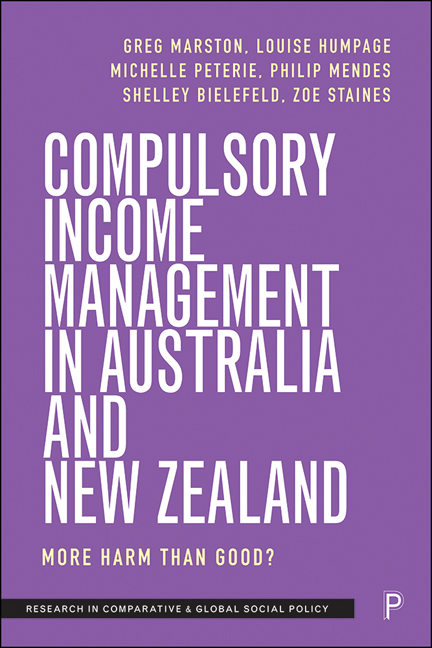Book contents
- Frontmatter
- Contents
- List of abbreviations
- About the authors
- Acknowledgements
- Series preface
- 1 Framing welfare conditionality
- 2 Why Income Management?
- 3 Barriers to implementing Compulsory Income Management
- 4 Identity and emotion
- 5 Procedural, consumer and contractual rights, and access to justice
- 6 Resistance and reform: individual and collective agency
- 7 Voluntary Income Management and financial education
- 8 Recalibrating social security and reimagining work
- References
- Index
8 - Recalibrating social security and reimagining work
Published online by Cambridge University Press: 08 October 2022
- Frontmatter
- Contents
- List of abbreviations
- About the authors
- Acknowledgements
- Series preface
- 1 Framing welfare conditionality
- 2 Why Income Management?
- 3 Barriers to implementing Compulsory Income Management
- 4 Identity and emotion
- 5 Procedural, consumer and contractual rights, and access to justice
- 6 Resistance and reform: individual and collective agency
- 7 Voluntary Income Management and financial education
- 8 Recalibrating social security and reimagining work
- References
- Index
Summary
Introduction
As social uncertainty and economic precarity grow, it is time to rethink the obligations of governments, particularly in regard to the ends and means of social security policy and meaningful employment. The global COVID-19 pandemic has given impetus to the ‘utopian demand’ (Weeks, 2011) for a fundamental reset of societal and economic goals. Addressing the inadequacy of income support payments, ensuring decent employment and training opportunities, valuing all forms of work, and ensuring affordable housing and accessible social services is arguably a better starting point for cultivating healthy and economically secure communities than persisting with punitive conditionality.
The final chapter in the book has three key aims. First, the chapter emphasises the key lessons from the rollout of CIM in Australia and New Zealand, from both an empirical and ethical point of view. Second, the chapter connects these findings with the broader social, economic and environmental context that is providing the catalyst for a reset of social security policy and practice. Third, the chapter points a way forward on social security policy, based on first principles, which would help reorientate policy settings and the public discourse around income security and the markers of social citizenship.
Bottom-up perspectives on the conditionality narrative
There are strong views on all sides of the CIM policy debate in Australia and New Zealand. There is little disagreement across the political spectrum about having a social security system focused on alleviating poverty and promoting participation in social and economic activities. There is, however, a great deal of disagreement about the best ways to achieve this goal. The extent to which the state should intervene to limit the freedoms of its citizenry is particularly contentious – especially if those limitations are not universally applied, if the reported benefits are contested, or where there is clear evidence that the policies are in fact causing material and psycho-social harm.
Chapters 4 to 7 of this book have illustrated that the evidence in support of continuing with CIM is weak. The research presented in this book is certainly not the first to suggest that this set of policy measures requires a fundamental rethink.
- Type
- Chapter
- Information
- Compulsory Income Management in Australia and New ZealandMore Harm than Good?, pp. 168 - 184Publisher: Bristol University PressPrint publication year: 2022



